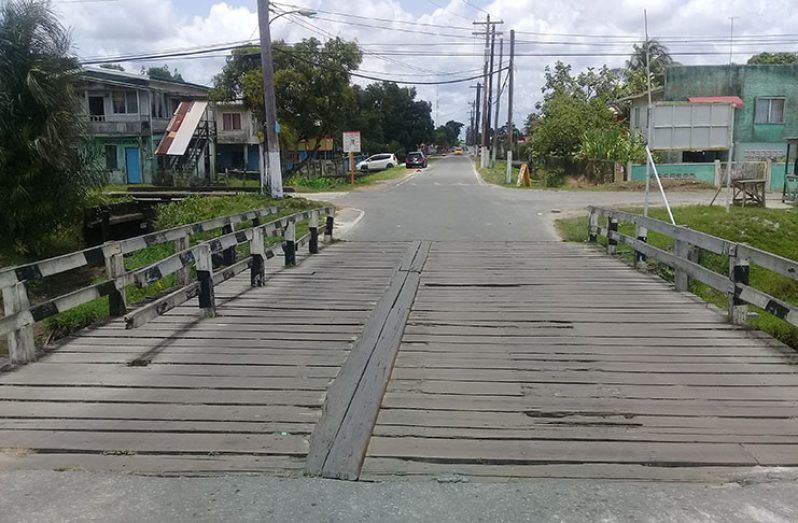THE quiet, semi- rustic farming community of Mocha/Arcadia is a community that is easy to miss. It is nestled far aback the New Providence Housing Scheme, off the East Bank of Demerara Public Road; isolated by distance and surrounded by dwindling cane fields deep in the backland area.
Added to the access challenges, was the disregard for the village experienced in the past, which Mocha residents believe contributed immensely to the slow growth of the village- which has just over 4,000 residents.
About two years ago, residents believe that Mocha/ Arcadia was treated with intense neglect. The roads in the community were derelict. Most, if not all, of the thoroughfares, were crater-filled and often times, drivers were not mindful of taking their vehicles into the area which meant residents were required to walk long distances to their homes. Tall grass and undergrowth were regular features; drains and other community facilities were neglected and unable to receive the necessary attention because of limited funds. Adequate lighting, demarcations and signage were absent.
NOT ANYMORE
Today, Mocha/Arcadia is rising from a lonely place, as residents work tirelessly to position the community in a place where they can benefit not just from the country’s expected oil wealth, but from activities that promote sustainable development and growth. This was according to Neighbourhood Democratic Council (NDC) Chairman, Mr. Rudolph Adams. Following a visit to the community, Adams related that a lot is now happening for Mocha/Arcadia.
He was proud to highlight, in particular, the physical changes the community has undergone since the ascension of the A Partnership for National Unity + Alliance for Change (APNU/AFC) government. With the new administration, came change, he said. This also meant a change in attitudes and behaviours. In the past persons were allowed to vend on community parapets and other spaces because of circumstances, while young people and those less academically inclined, procrastinated and spent many of their days ‘liming’ on the street corners. These are habits that are hardly evident now, even though there is room for much more improvement.
It was for these reasons, programmes targetting young and older persons were rolled out with the help of Central Government and the Caribbean Local Economic Development Programme (CARILED), a Canadian-funded organisation that works to improve the capacity of local government by working with individual communities.
The Ministry of Communities and the Ministry of Public Security both have programmes targetting, in particular, young people in the areas of entrepreneurial training and skills development. “But one challenge to the NDC is getting them (young people) to come out,” Adams said.
He spoke of the unwillingness by persons to attend community meetings, training programmes and other such events. One training programme, it was pointed out, was supposed to help assess the abilities of the people in the area before a comprehensive approach could be taken. However, after a commendable turnout, the numbers soon started to dwindle, the Chairman related.
CONSULTATION NEEDED
Some young people in Mocha/ Arcadia are of the belief that the approach towards them is misguided, insisting instead that when leaders visit the community with the aim of implement programmes that target specific groups, it would better serve the purpose if prior consultation is done with the targeted groups to ascertain what are some of the things they like and appreciate so as to capture their attention, as well as, keep them interested and occupied.
Twenty-eight-year-old Travis Kulen who was born and raised in Mocha/ Arcadia, is an electrician, however, he only gets work only when it is available. This young man wants to establish and operate his own electrical firm, but he lamented that access to capital and assistance with the basic know-how in relation to business plans, are areas where he really needs some guidance.
Then there is Matilda Gittens, a 23-year-old housewife and mother of two, her interest is in opening a cosmetic shop in her community, but like Kulen, she lacks the much-need financial capital.
Thirty-one-year-old Kenton Haynes, and 40-year-old, Clint Ramdular, is a miner and businessman, respectively. They, too, say they find it hard to cope in their community. Ramdular, for instance, said he was self –employed as he operated a detachable food tray, however it was removed by the NDC. “ They (NDC) say Mocha/Arcadia is a family- oriented community where almost everyone is related, but a farmer selling large amounts of produce at a cheap cost to residents, many of whom who need it, is barred from operating at the roadside.
“Yes they have programmes, and yes, it is hard to get people, but that is because ideas are being offered that many are not interested in,” members of the group pointed out. The young people have suggested the startup of community groups to which capital and guidance can be offered for farming and livestock rearing, which they say has potential in the community.
The young people noted too, that more opportunities must be created for sports and other talents that young people possess as that is what will keep them interested, even as they reiterated that too much time is taken to implement programmes. “When people got mouths to feed you think dem able sit down and listen to you over and over? ” one youth remarked.
The young Mocha/Arcadia residents are, however, very pleased with the physical changes in their community and have commended their NDC for helping to improve roads, street lights and drains.
And, while they proudly declared that their community rarely experiences crime, they remain adamant that more collaboration and a genuine move to improve the lives of the young people now and for the future has to be made.



.jpg)











